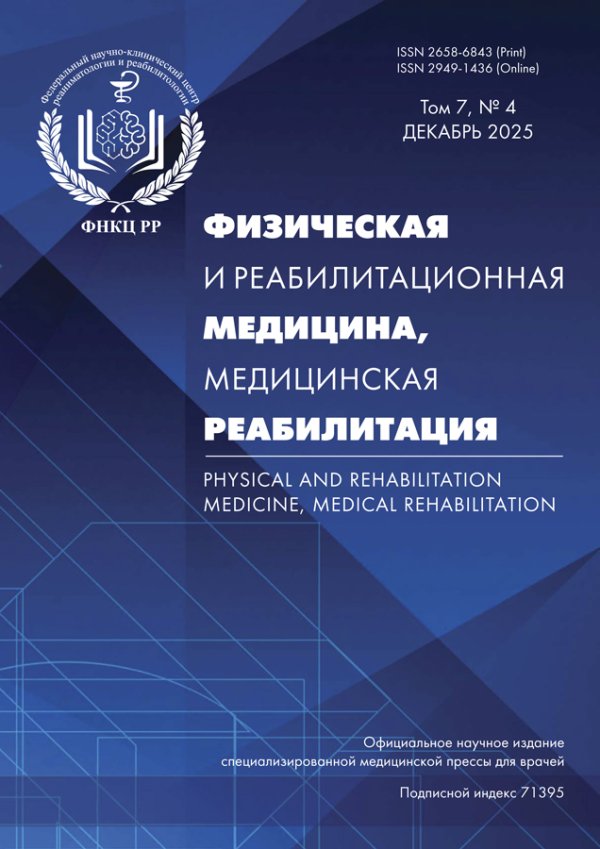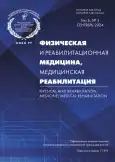Possibilities of using innovative non-drug technologies in the rehabilitation of patients with early post-stroke cognitive impairment
- Authors: Tynterova A.M.1, Shusharina N.N.1, Barantsevich E.R.2
-
Affiliations:
- Immanuel Kant Baltic Federal University
- Academician I.P. Pavlov First Saint Petersburg State Medical University
- Issue: Vol 6, No 3 (2024)
- Pages: 230-242
- Section: ORIGINAL STUDY ARTICLE
- URL: https://journal-vniispk.ru/2658-6843/article/view/269350
- DOI: https://doi.org/10.36425/rehab633828
- ID: 269350
Cite item
Full Text
Abstract
BACKGROUND: One of the leading factors complicating social adaptation after ischemic stroke is cognitive and motor impairment.
AIM: This study aimed to evaluate the effect of rehabilitation using virtual reality technologies and the influence of the main clinical and functional parameters on virtual reality (VR) therapy in patients with different degrees of cognitive decline in the acute period of ischemic stroke.
MATERIALS AND METHODS: This study examined 170 patients diagnosed with ischemic stroke with cognitive decline according to the Montreal Cognitive Assessment. Depending on the volume of therapy, the patients were divided into two groups: group 1 included 120 patients who received additional therapy using VR technologies (62 patients with moderate cognitive impairment, 58 patients with dementia), and group 2 consisted of 50 patients who received only basic therapy and standard methods of early rehabilitation. In group 1, on days 4–5 following basic therapy, rehabilitation using VR was performed. The Barthel Index (BI) scale, Rankin Scale (mRS), and National Institute of Health Stroke Scale (NIHSS) were used to examine cognitive and functional status, and tests were performed to assess cognitive functions, as well as neuroimaging scales ASPECTS, STRIVE, and MTA. The effectiveness of rehabilitation (ΔRE) was measured by the indicator of changes in the parameters of the VR system before and after treatment.
RESULTS: A more significant improvement of the patient’s independence and regression of perceptual and executive functions was demonstrated in group 1 than in the control group. In patients with MCI, significant improvement was observed in all cognitive and functional parameters except semantic information processing, attention, and constructive praxis. In patients with dementia, improvement was noted in NIHSS, speech and amnestic disorders. In group 1, ΔRE was found to be associated with the parameters of perception, attention, semantic information processing, IQCODE, and NIHSS and the presence of hypertension and repeated stroke. In patients with MCI, ΔRE was correlated with lesion size, attention level, BI, mRS, and NIHSS and with age, sex, degree of IQCODE and STRIVE, semantic aphasia, and perceptual impairment in patients with dementia.
CONCLUSION: The present study revealed a polymorphism of factors influencing the effectiveness of VR therapy in patients with varying degrees of cognitive decline. Modern approaches to VR rehabilitation of patients with post-stroke cognitive impairment require the development of individual methods of rehabilitation using immersion environment focused on the structure, etiology, and severity of cognitive deficit considering the degree of the patient’s functional state.
Full Text
##article.viewOnOriginalSite##About the authors
Anastasya M. Tynterova
Immanuel Kant Baltic Federal University
Author for correspondence.
Email: antynterova@mail.ru
ORCID iD: 0000-0003-1743-4713
SPIN-code: 2999-5812
MD, Cand. Sci. (Medicine), Associate Professor
Russian Federation, 14 Nevskogo street, 236041 KaliningradNatalia N. Shusharina
Immanuel Kant Baltic Federal University
Email: nshusharina@kantiana.ru
ORCID iD: 0000-0002-8848-6134
SPIN-code: 6223-5146
Cand. Sci. (Pedagogical)
Russian Federation, 14 Nevskogo street, 236041 KaliningradEvgenii R. Barantsevich
Academician I.P. Pavlov First Saint Petersburg State Medical University
Email: professorerb@mail.ru
ORCID iD: 0000-0003-3804-3877
SPIN-code: 9715-2844
MD, Dr. Sci. (Medicine), Professor
Russian Federation, 6-8 Lev Tolstoy street,197022 Saint PetersburgReferences
- Klochikhina OA, Shprakh VV, Stakhovskaya LV, et al. Dynamics of stroke incidence and mortality indicators over eight-year period in the territories included into the federal program of reorganization of care for patients with stroke. Acta Biomed Sci. 2021;6(1):75–80. EDN: WPNTHD doi: 10.29413/ABS.2021-6.1.10
- Kabysh SS, Prokopenko SV, Golikova-Chereshkevich АV, et al. Cognitive functions in acute ischemic stroke period. Doctor. Ru. 2023;22(6):67–71. EDN: WAZWBW doi: 10.31550/1727-2378-2023-22-6-67-71
- Levin OS, Bogolepova AN. Poststroke motor and cognitive impairments: Clinical features and current approaches to rehabilitation. S.S. Korsakov J Neurol Psych. 2020;120(11):99–107. EDN: VZORCZ doi: 10.17116/jnevro202012011199
- Koberskaya NN, Mkhitaryan EA, Lokshina AB, Grishina DA. Pre-dementia cognitive impairment. Russ J Geriatric Med. 2022;(1): 48–57. EDN: HDBTXJ doi: 10.37586/2686-8636-1-2022-48-57
- Regier DA, Kuhl EA, Kupfer DJ. The DSM-5: Classification and criteria changes. World Psychiatry. 2013;12(2):92–98. doi: 10.1002/wps.20050
- Ivanova GE. Medical rehabilitation: Problems and solutions. Clinical Nutr Metabolism. 2020;1(1):8–9. EDN: GBKVHQ doi: 10.17816/clinutr33032
- Demeco A, Zola L, Frizziero A, et al. Immersive virtual reality in post-stroke rehabilitation: A systematic review. Sensors (Basel). 2023;23(3):1712. EDN: JUYXAW doi: 10.3390/s23031712
- Liu Y, Tan W, Chen C, et al. A review of the application of virtual reality technology in the diagnosis and treatment of cognitive impairment. Front Aging Neurosci. 2019;11:280. doi: 10.3389/fnagi.2019.00280
- Lee HC, Huang CL, Ho SH, Sung WH. The effect of a virtual reality game intervention on balance for patients with stroke: A randomized controlled trial. Games Health J. 2017;6(5):303–311. doi: 10.1089/g4h.2016.0109
- Shen J, Gu X, Yao Y, et al. Effects of virtual reality-based exercise on balance in patients with stroke: A systematic review and meta-analysis. Am J Phys Med Rehabil. 2023;102(4):316–322. doi: 10.1097/PHM.0000000000002096
- Patsaki I, Dimitriadi N, Despoti A, et al. The effectiveness of immersive virtual reality in physical recovery of stroke patients: A systematic review. Front Syst Neurosci. 2022;16:880447. EDN: JMRIFL doi: 10.3389/fnsys.2022.880447
- Zhang T, Liu W, Bai Q, et al. Virtual reality technology in the rehabilitation of post-stroke cognitive impairment: An opinion article on recent findings. Front Psychol. 2023;14:1271458. EDN: VZXBOY doi: 10.3389/fpsyg.2023.1271458
- Wiley E, Khattab S, Tang A. Examining the effect of virtual reality therapy on cognition post-stroke: A systematic review and meta-analysis. Disabil Rehabil Assist Technol. 2022;17(1):50–60. doi: 10.1080/17483107.2020.1755376
- Chen X, Liu F, Lin S, et al. Effects of virtual reality rehabilitation training on cognitive function and activities of daily living of patients with poststroke cognitive impairment: A systematic review and meta-analysis. Arch Phys Med Rehabil. 2022;103(7):1422–1435. EDN: JPXQKZ doi: 10.1016/j.apmr.2022.03.012
- Razumnikova OM, Trubnikova OA. Use of virtual reality technologies to restore cognitive functions and quality of life: An application for cardiac patients with brain ischemia. Complex Issues Cardiovasc Dis. 2023;12(4):133–148. EDN: HOQPYM doi: 10.17802/2306-1278-2023-12-4-133-148
- Pinho J, Quintas-Neves M, Dogan I, et al. Incident stroke in patients with Alzheimer’s disease: Systematic review and meta-analysis. Sci Rep. 2021;11:16385. doi: 10.1038/s41598-021-95821-x
- Hazelton C, Thomson K, Todhunter-Brown A, et al. Interventions for perceptual disorders following stroke. Cochrane Database Syst Rev. 2022; 11(11):CD007039. EDN: ODVTQM doi: 10.1002/14651858.CD007039.pub3
- Vourvopoulos A, Pardo OM, Lefebvre S, et al. Effects of a brain-computer interface with virtual reality (VR) neurofeedback: A pilot study in chronic stroke patients. Front Hum Neurosci. 2019;13:210. doi: 10.3389/fnhum.2019.00210
- Giachero A, Calati M, Pia L, et al. Conversational therapy through semi-immersive virtual reality environments for language recovery and psychological well-being in post stroke aphasia. Behav Neurol. 2020;2020:2846046. EDN: BYVAHO doi: 10.1155/2020/2846046
- Maximova MYu, Sazonova VYu, Ayrapetova AS. Gender features in cerebrovascular disorders in different age groups. Ann Clin Exp Neurol. 2019;13(3):11–19. EDN: JAFPMN doi: 10.25692/ACEN.2019.3.2
- Grefkes C, Fink GR. Recovery from stroke: Current concepts and future perspectives. Neurol Res Pract. 2020;2:17. doi: 10.1186/s42466-020-00060-6
Supplementary files










